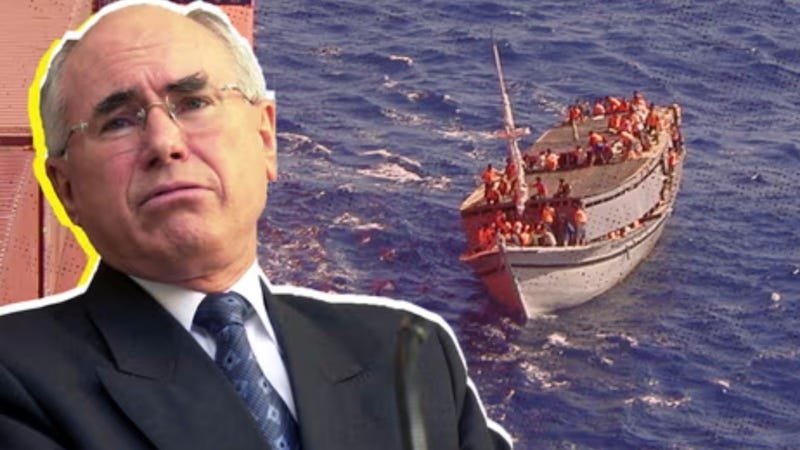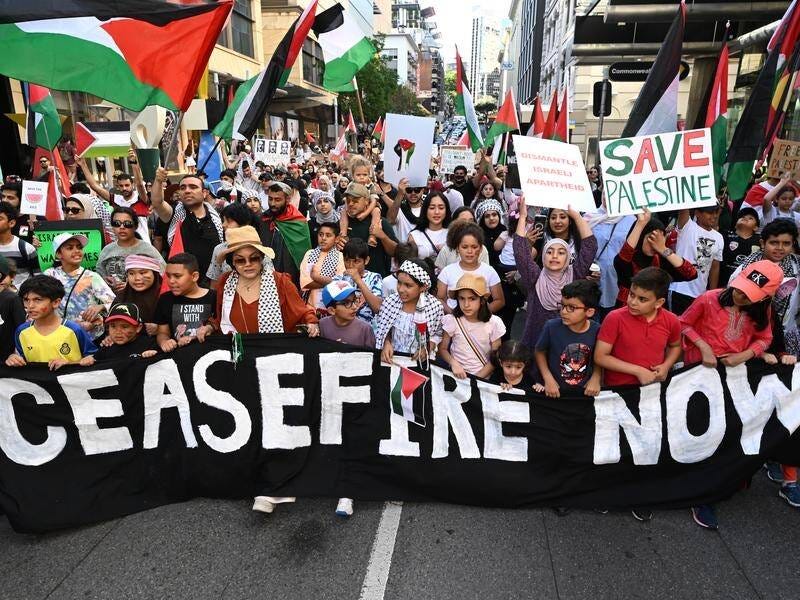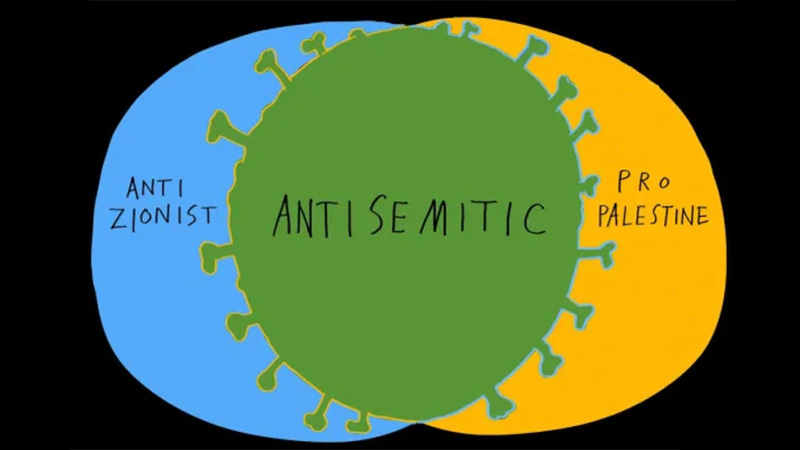Australia’s unquestioning support for Israel and a deafening silence
If Australia is to truly engage with the complexities of the Middle East, it must first reconcile its own role in perpetuating harmful narratives and begin to listen to the voices it has long ignored.
The conflict in Lebanon, spurred by Israel’s expansion of military action beyond Palestine, brings into sharp focus a long history of territorial aggression, misrepresentation in Western media, and cynical political games in countries like Australia. The escalation into Lebanon is not a new chapter but rather an extension of Israel’s aggressive posturing, a strategy it has employed for decades with impunity.
Since the invasion of Lebanon, the Israeli Defense Forces have pushed forward with strikes that have caused considerable devastation. Iran’s response, in the form of missile attacks, follows a predictable script of retaliation that gets highlighted and exaggerated by the global media, which in turn paints Lebanon and Iran as the primary antagonists. This media narrative – especially in Australia – glosses over the fundamental reality that Israel is the main aggressor in this scenario, continuing its campaign of occupation and violence.
Since the most recent eruption of conflict, with its beginnings on October 7 last year, the human cost has been staggering. By many estimates, at least 42,000 Palestinians have been killed – potentially rising to 200,000, according to the medical journal Lancet – and over 2,000 Lebanese lives, while, during this time, 1,700 Israelis have been killed.
These numbers are not presented to create a hierarchy of suffering but to highlight the asymmetry of the violence. Around 99 per cent of all deaths have been inflicted by Israeli forces and settler paramilitary groups in the West Bank, while 1 per cent can be attributed to Hamas, Hezbollah, and the state of Iran. This disparity makes it clear who the primary perpetrators of violence are yet, this critical perspective is conveniently absent from mainstream Australian discourse, where figures such as leader of the opposition Peter Dutton seek political capital in the conflict.
Dutton’s exploitation of this conflict for domestic political gain is clearly evident. His remarks about the Australian government’s response paint a picture of weakness, casting Prime Minister Anthony Albanese as ‘failing in his leadership duties’. His criticism, however, conveniently ignores the broader historical and ethical context of Israel’s actions, reducing a complex international crisis into an opportunity for political point-scoring and appealing to the Australian right-wing base, eager to see a more testosterone-fuelled response in alignment with the West’s pro-Israel stance.
Senator Bridget McKenzie – not known for any expertise on Middle East affairs at all – also chimed in, selectively championing the United Nations’ call for Hezbollah’s removal from the northern border of Israel, conveniently ignoring Israel’s continued violation of countless UN resolutions. Such one-sided rhetoric not only fuels Islamophobia and xenophobia but also contributes to the further alienation of Arab and Muslim communities in Australia.
This marginalisation was further exacerbated by statements from Home Affairs Minister Tony Burke and, as an MP representing a western Sydney seat, where 25% of voters come from an Islamic background, he should know better. Burke linked claims of hate speech and symbols to the Islamic community, even threatening to revoke the visas of those displaying the Hezbollah flag or images of its recently assassinated leader, Hassan Nasrallah.
The political responses in Australia reveal the extent to which the conflict is being manipulated for ideological and political gain. The reflexive alignment Australian political parties with pro-Israel rhetoric, while casting any dissent or criticism as support for terrorism, reveals an intellectual and moral bankruptcy. These positions rely on a wilful ignorance of historical facts and a cynical exploitation of the fear and anxiety surrounding Middle Eastern conflicts. For politicians such as Dutton and McKenzie, it is easier to stoke division and fear than to engage in the complex realities of the conflict, where Israel’s actions must be critically assessed against the backdrop of decades of occupation, violence, and expansionism.
The reduction of complex historical, cultural, and political issues into talking points meant to fuel ideological divisions only makes the conflict worse. It reduces the Australian public’s understanding of a deeply nuanced issue to simplistic narratives of good versus evil, perpetuating the myth that Israel’s actions are purely defensive. It also contributes to the larger global problem of how Western countries, including Australia, uncritically accept and support Israel’s militaristic approach, further emboldening it to expand its aggression into countries like Lebanon and beyond.
How Australia’s national security rhetoric fuels Islamophobia
Ever since the late 1990s, when John Howard’s Liberal–National Coalition government began to sharpen its focus on asylum seekers and border security, national security has been the Achilles’ heel of the Labor Party. Key events such as the Tampa crisis in 2001 and the September 11 attacks in the U.S. dovetailed perfectly with these narratives, creating a political environment where security could easily be exploited to generate fear, division, and justify far-reaching, authoritarian policies. Over the years, these issues have grown to become a permanent fixture of Australian politics, linking internal policies with Middle Eastern geopolitics, particularly Palestine.
What is remarkable is how, more than two decades later, the Labor Party has still not devised an effective strategy to counter these conservative national security narratives. Rather than challenging the framing or interrogating the supposed links between domestic security and foreign conflicts, Labor often capitulates to the Liberal Party’s agenda, whether they’re in government or not. This reluctance to push back results in poor legislation that not only infringes on civil liberties but also disproportionately affects marginalised communities. The willingness of both major parties to prioritise “security” over human rights perpetuates harmful stereotypes, further marginalising communities that are already under immense social and political pressure.
In recent years, this tendency has intensified, particularly when it comes to Palestinian solidarity movements in Australia. Pro-Palestine events in cities like Sydney and Melbourne have drawn large crowds, reflecting the deep sense of hurt and suffering felt by many in the Arab and Muslim communities, especially in response to the violence in Gaza and the West Bank. Despite the peaceful nature of these gatherings, media narratives and political rhetoric often paint these protests as dangerous or extremist.
It is in these moments that national security rhetoric is deployed most cynically, conflating peaceful protest with terrorism, and using symbols like the Hezbollah flag to justify police crackdowns and oppressive legislation – the presence of a yellow flag is deemed by the establishment to be more threatening than the ongoing violence in the Middle East, where tens of thousands of people have been killed by Israeli forces. This rhetoric reveals how national security is used as a blunt tool to suppress expressions of solidarity with oppressed peoples, even when those expressions are peaceful and legal.
The escalating crackdown on Palestinian solidarity movements in Australia sets a dangerous precedent. It not only criminalises symbols of resistance but also reaffirms a broader pattern of equating national security with the suppression of dissent, particularly when that dissent is tied to Muslim or Arab communities. The focus on security becomes less about protecting the Australian public and more about reinforcing the dominance of a particular narrative – one that positions Israel as the victim only and any critique of its actions as inherently dangerous. This framing not only distorts the realities of the Middle East conflict but also stifles the political discourse necessary to hold both Israel and Australia’s political establishment accountable.
By treating these solidarity movements as a national security threat, Australia is aligning itself with a broader global trend that seeks to criminalise criticism of Israel while bolstering support for its continued occupation of Palestinian land and beyond. This trend is not unique to Australia – but a very common trait of the settler-coloniser states of Britain, Canada and the United States, whose support for Israel has been most vociferous – where the government’s commitment to security at all costs has consistently led to the erosion of civil liberties and the marginalisation of communities deemed the other.
How politics and media silence Palestinian and Arab voices
The Australian political class, along with the mainstream media, have long taken a one-sided approach when it comes to Israel and its ongoing occupation of Palestine, a position that is mirrored in the country’s broader discourse on the Middle East – it paints Israel as a nation under siege, constantly threatened by an aggressive Arab world, while ignoring or minimising the suffering inflicted upon Palestinians, Lebanese, and other Middle Eastern communities. Even the illustrations and cartoons in mainstream media must reflect a pro-Israel bias, ensuring that everyone is aligned in promoting the cause.
A narrative that is rarely heard in Australia is that the Arab world, particularly the 57-member Arab and Muslim coalition, is ready to guarantee Israel’s security in exchange for an end to the occupation and the creation of an independent Palestinian state. This is a narrative of peace, a plan for co-existence, but it is also a plan that the Israeli government continues to ignore. Instead, Israel perpetuates cycles of violence with no long-term vision for peace.
Australian politicians and media, aligned with Israel’s narrative, fail to critically interrogate this lack of an endgame. They instead propagate the notion that Israel’s security can only be guaranteed through military dominance and suppression of Palestinian resistance, ignoring decades of diplomatic efforts from the Arab world that have sought a two-state solution.
What remains bewildering is how little the Australian public knows about these alternatives, largely because the media and political elite focus on a singular, distorted narrative that portrays Israel as a beleaguered nation fending off existential threats and is the true partner for peace that is ignored by the Arab world. The reality, however, is far more complex, with Israel being a military powerhouse that has consistently pursued expansionist policies at the expense of Palestinian lives and land. And yet, discussing Israel’s role as an aggressor is virtually taboo in Australian political discourse. Any deviation from the mainstream narrative, especially in defence of Palestine and now, Lebanon, is often framed as radicalism or extremism, once again marginalising voices that seek to highlight the brutal realities of occupation.
In Australia, mainstream political figures are entirely comfortable supporting Israeli policies that many human rights organisations have labelled as apartheid, while paying lip service to human rights in their rhetoric. The term apartheid itself, when applied to Israel, is met with accusations of anti-Semitism, even though it is a well-documented reality for Palestinians living under occupation, subjected to different laws, movement restrictions, and systemic violence. This complicity in maintaining Israel’s oppressive regime is troubling, particularly given the increasing global recognition of Israel’s violations of international law.
The Australian media also plays a significant role in perpetuating these distortions – media outlets regurgitate the same pro-Israel talking points, framing the conflict in binary terms: Israel as a democracy defending itself against barbaric, radical forces. The violence and suffering inflicted on Palestinians and Lebanese civilians, often framed as unfortunate collateral damage, rarely make the headlines in a way that captures the depth of the human tragedy.
In Australian politics, the Australian Greens have consistently raised concerns about these issues, but their voices are also marginalised. The broader political class, including the Labor government, tends to fall in line with the dominant narrative, perhaps out of fear of being branded anti-Israel or anti-Semitic. Yet, this silence does not only reflect a lack of political courage; it speaks to a deeper failure to represent the diversity of opinion within Australia itself.
The Arab and Muslim communities have contributed significantly to Australian society yet, they remain an easy target for demonisation, especially when tensions flare in the Middle East, and this is compounded by a simplistic understanding of those communities and Islam itself. Australian media and politicians often lump the diverse range of Islamic thought and practice into a monolithic category, focusing primarily on the most radical elements while ignoring the rich diversity of opinion within the faith.
The demonisation of Middle Eastern Muslims in particular mirrors broader Western tendencies to ignore the progressive and peaceful voices within Islam, an approach that is not only intellectually lazy but dangerous, as it fuels further Islamophobia and alienates Australian Muslims from the political process.
In contrast, Australia’s political class demonstrates an unwavering commitment to conservative Zionism, conflating the interests of the Israeli state with those of the Jewish people. This conflation is not only inaccurate but harmful, as it silences critical voices within the Jewish community itself, many of whom oppose the Israeli government’s policies. Figures such as Noam Chomsky and many other Jewish intellectuals have long critiqued Israel’s expansionism, yet their voices are often ignored or sidelined in favour of maintaining a simplistic narrative that casts any criticism of Israel as inherently anti-Semitic. Newer local voices such as the Jewish Council of Australia are also frequently ignored, mainly because they also present an alternative progressive perspective to the prevailing conservative Zionist narrative.
Ultimately, what is needed is a more honest and open discussion about these issues, one that acknowledges the complexities of the Israel–Palestine conflict and allows for diverse perspectives within Australia. Politicians need to move beyond the tired and lazy security rhetoric that demonises the Arab world and Muslims, and instead, engage with the root causes of the conflict, including calling out Israel’s ongoing occupation and systemic violence. Such a shift would not only help improve Australia’s foreign policy but also foster a more inclusive and empathetic domestic discourse, where all communities are respected and their contributions to society are recognised.













Thank you for writing this. It’s vital to counter the dominant Zionist narrative in Western politics and media.